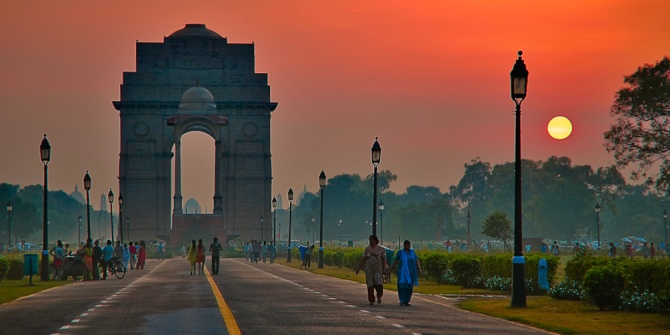Cost of Living in Nigeria Compared to India

India is the seventh-largest and the second-most populous nation in the world, with over 1.2 billion people. Nigeria’s size in area is about a fourth of India’s. As of 2015, Nigeria is the world’s 20th largest economy, worth more than $500 billion in terms of nominal GDP, while that of India in 2017 is US$2.454 trillion, making it the sixth-largest economy by market exchange rates. Nigerian GDP at purchasing power parity (PPP) has almost tripled from $170 billion in 2000 to $451 billion in 2012. The number of Indians living in Urban areas has also grown by 31.2% between 1991 and 2001, and in 2011, India had 486.6 million workers, making her world’s second-largest labour force, but she still faces socio-economic challenges.
In 2006, India contained the largest number of people living below the World Bank’s international poverty line of US$1.25 per day. According to a Food and Agriculture Organization report in 2015, 15% of the population is undernourished and 30.7% of her children under the age of five are underweight.
CHECK: PROPERTIES FOR SALE IN NIGERIA

Challenges such as low capital goods import, infrastructural decay, and minimal private sector investment, affect sustainable and inclusive economic and social development within India. Infrastructure development and entrepreneurship through national and international collaborations provide valuable opportunities for development. India requires at least $1 trillion to develop new infrastructure. Investments by public, private sectors and public-private partnerships, are components that help to drive growth.
There are 36 states in Nigeria whereas India is composed of 29 states and 7 union territories. Nigeria is classified as a mixed economy emerging market and has already reached lower middle income status according to the World Bank, with its abundant supply of natural resources, well-developed financial, legal, communications, transport sectors and stock exchange (the Nigerian Stock Exchange), which is the second largest in Africa.
Petroleum plays a large role in the Nigerian economy, accounting for 40% of GDP and 80% of Government earnings. Nigeria is the 12th largest producer of petroleum in the world and the 8th largest exporter and has the 10th largest proven reserves. Agriculture used to be the principal foreign exchange earner of Nigeria. As of 2010, about 30% of Nigerians are employed in agriculture, but the largely subsistence agricultural sector has not kept up with rapid population growth, and the country now imports some of its food products. For decades, Nigeria has been hindered by mismanagement, suffering recession in the past one year. There has to be total reform in order for the country to achieve her full potential in all sectors.
In comparing Nigeria to India, these are the major differences:

Indices Difference
Consumer Prices in Lagos are 34.48% higher than in Delhi
Consumer Prices Including Rent in Lagos are 50.60% higher than in Delhi
Rent Prices in Lagos are 105.65% higher than in Delhi
Restaurant Prices in Lagos are 10.31% lower than in Delhi
Groceries Prices in Lagos are 39.32% higher than in Delhi
Local Purchasing Power in Lagos is 71.78% lower than in Delhi
Below is a list compiled by Numbeo.com, based on the contribution of over 500 people. It shows comparison between the cost of living in Nigeria and India
CHECK: PROPERTIES FOR RENT IN NIGERIA
| Restaurant | Delhi | Lagos | Difference |
| Meal, Inexpensive Restaurant | 250.00 Rs (1,223.50 ₦)
| 102.17 Rs (500.00 ₦)
| -59.13 %
|
| Domestic Beer (0.5 liter draught | 100.00 Rs (489.40 ₦ | 58.23 Rs (285.00 ₦) | -41.77 % |
| Cappuccino (regular) | 115.49 Rs (565.21 ₦) | 163.47 Rs (800.00 ₦) | +41.54 % |
| Coke/Pepsi (0.33 liter bottle) | 29.56 Rs (144.66 ₦) | 21.33 Rs (104.41 ₦) | -27.82 %
|
| Water (0.33 liter bottle) | 14.45 Rs (70.73 ₦) | 11.51 Rs (56.33 ₦) | -20.35 |
| Market | |||
| Milk (regular), (1 liter) | 47.05 Rs (230.27 ₦) | 143.03 Rs (700.00 ₦) | +203.99 % |
| Loaf of Fresh White Bread (500g) | 26.39 Rs (129.18 ₦) | 64.36 Rs (315.00 ₦) | +143.85 % |
| Rice (white), (1kg) | 56.47 Rs (276.37 ₦) | 123.88 Rs (606.25 ₦) | +119.36 % |
| Apples (1kg) | 136.73 Rs (669.17 ₦) | 176.32 Rs (862.94 ₦) | +28.96 % |
| Tomato (1kg) | 35.33 Rs (172.92 ₦) | 116.76 Rs (571.43 ₦) | +230.46 % |
| Pack of Cigarettes (Marlboro) | 246.00 Rs (1,203.93 ₦) | 51.08 Rs (250.00 ₦)
| -79.23 % |
| Transportation | |||
| One-way Ticket (Local Transport) | 25.00 Rs (122.35 ₦) | 30.65 Rs (150.00 ₦) | +22.60 % |
| Gasoline (1 liter) | 68.07 Rs (333.14 ₦) | 29.63 Rs (145.00 ₦) | -56.48 % |
| Toyota Corolla 1.6l 97kW Comfort (Or Equivalent New Car) | 1,479,970.15 Rs (7,242,983.65₦) | 1,243,016.99 R (6,083,333.33₦) | -16.01 % |
| Rent Per Month | |||
| Apartment (1 bedroom) in City Centre | 15,915.84 Rs (77,892.23 ₦) | 38,823.00 Rs (190,000.00 ₦) | +143.93 %
|
| Apartment (3 bedrooms) in City Centre | 40,940.59 Rs (200,363.54 ₦)
| 83,980.27 Rs (411,000.00 ₦) | +105.13 %
|
| Salaries And Financing | |||
| Average Monthly Net Salary (After Tax) | 42,417.17 Rs (207,589.89 ₦) | 18,024.60 Rs (88,212.50 ₦) | -57.51 %
|








Interesting read,on the average ,the cost of Living in India in terms of food prices in the market is cheaper as expected due to manpower for agriculture, I was surprise with the cost of gas there but then again, we are an oil exporting country.
In total, checking the cost of food and rent plus the average monthly salary for India, Nigeria is one tough place.Nice insight.